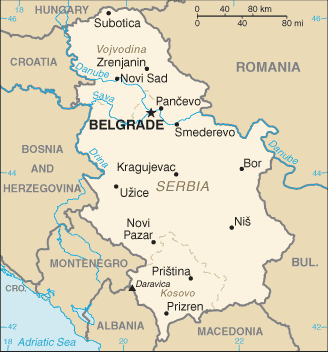Serbia

Serbia is a republic in the Balkan Peninsula. The official language is Serbian, and the capital is Belgrade.
The Serbs were a Slavic tribe who migrated from somewhere in the Proto-slavic homeland-first briefly stopping in an area at the border of today's Germany and Poland, and then finally settling in the Balkans.
There were several early Serbian medieval states, which had to defend themselves from both Eastern Roman and Bulgarian attempts at subjugating them. The most long-lasting and powerful incarnation of a Serbian medieval state rose in 1217, and was led into a golden age of prosperity and slow territorial increase by the Nemanjic dynasty. At one point, Dushan Nemanjic, an extremely sucessfull and capable ruler, managed to conquer a huge part of the Balkans and proclaim a Serbian Empire, aiming to create a strong state that would replace the Byzantines as the dominant power in the region and as the main obstacle to the impending Turkish invasion, but the plan never came to fruit as he died relatively young and was suceeded by an incompetent son.
Soon after the son's death, Serbia was no longer an Empire even on paper, but rather an extremely loose conglomeration of noble realms and fiefdoms. Prince Lazar, along with several other nobles, sucessfully fought back against the Ottoman invasion, but after he was killed at the Battle of Kosovo, the Serbian state lost all hope of ever returning to its original power and stability. It remained independent, in some capacity, for the first half of the fifteenth century, before the Ottomans conquered it for good. Serbia was a part of the Ottoman Empire until the early 19th century, when it became a functionaly independent state. During this period, Russia and Austria competed to include Serbia in their respective spheres of influence, which led to one of the main causes of World War One.
After the war, Serbia was merged with Montenegro and a collection of former Austrian possessions to create Yugoslavia. During WWII Yugoslavia, surrounded by hostile neighbours and boiling with internal tensions, started aligning itself with the Axis; however, in 1941, immediately after the government has signed a pact officially joining Yugoslavia with the Axis powers, the Serbian military officials organized a coup, supported by the people, dethroning the pro-axis regency council and installing a new government which was techically headed by the underage King himself. Angered, the Axis attacked Yugoslavia and occupied it after a brief struggle; parts were annexed to Hungary, Bulgaria, Germany, and Italy and its protectorates, and the rest divided into the Croatian and Serbian puppet states; In 1945, after the partisans and the Red Army have liberated its' territory, they reorganized Yugoslavia into a federation of six republics under a communist government led by Josip Broz Tito. Despite being Communist, however, it was not a Soviet satellite, remaining neutral throughout the Cold War and helping to found the Non-Aligned Movement.
While Tito was not a benevolent leader by any stretch of the imagination, he was at least able to keep ethnic tensions from bubbling to the surface. The combination of Tito's death and economic collapse stoked nationalist fervor in the Yugoslav republics, leading Slovenia, Croatia, Bosnia, and Macedonia to secede. The remainder of Yugoslavia retaliated by attacking Slovenia and Croatia and supporting Serb nationalists in Bosnia's civil war.
The two remaining republics (Serbia and Montenegro) formed a new state, which was also called Yugoslavia. When violence between local Yugoslav law enforcement and Albanian seperatist militias and terrorists in Serbia's troubled province of Kosovo escalated in 1998 into an all-out war, NATO interfered on March 1999 for the second time (the first being NATO's assistance to Bosnia and Croatia in the Bosnian War) on behalf of the Albanians ending the war after a 78 day long bombing campaign of both Serbia and Montenegro. Yugoslavia subsequently lost control of Kosovo, which was still considered to be a Serbian province but was under UN administration.
The state was reorganized again in 2003, creating an extremely loose union between Serbia and Montenegro creatively named Serbia and Montenegro. Montenegro left the union three years later, rendering Serbia an independent nation again after nearly 90 years. Kosovo declared independence a second time in 2008 (the first time being 1990 which was recognized only by Albania), which was not resisted like before, but has not been recognized by a majority of the world's nations (only over 85 so far).
Serbia in fiction
- The films of Emir Kusturica
- A Serbian Film (even though many Serbians regret this)
